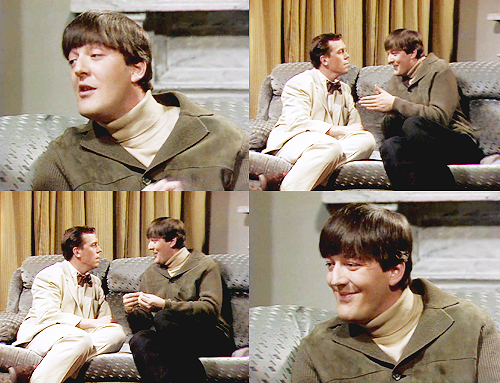
Amazingly, I had set this post for today, and so since it's the day for a share in my rotation in the BLOG VACATION II, then rightly so, time to share.


Andrea S. Calude // TED-ED
You're telling a friend an amazing story, and you just get to the best part when suddenly he interrupts, "The alien and I," not "Me and the alien."

Creativity and/or Prescriptivism
In a cult sketch on language, Stephen Fry compares the inexhaustible creative potential of language to that of music. The structure of language comprises a limited set of parts, just as a piano keyboard has a limited set of keys. However, they are both capable of producing an infinite number of combinations, each representing, as Fry puts it so vividly, “a unique child delivered of a unique mother”. And yet, he continues, we end up saying the same things over and over again. Could prescriptivism have something to do with that?
The genius of Fry is that he manages to touch upon a very serious subject and make a very valid point about it while being hilarious at the same time. What he is actually referring to is how we have tried to stifle linguistic creativity with rules regarding just about any part of language usage, starting from simple grammatical rules, to complex rules referring to collocational patterns, style, appropriateness, the logic of a construction, and so forth.
As a non-native speaker of English, I have always felt that English is one of the rare languages in the world that has that great creative potential which allows a speaker to express exactly what they feel even if they are using an unusual combination of words. I always felt that, for instance, you can unleash your linguistic creativity and combine any verb or adjective with any preposition as long as it makes sense and expresses what you are trying to say more accurately, even though usage guides advise otherwise. It turns out, I have been living in delusion. Native speakers of English tend to have really specific ideas about which combinations are acceptable and which are not; these ideas do not differ greatly from what one would encounter in a prescriptive usage guide. Allan Metcalf, professor of English, author, blogger, AND a native English speaker, was recently the subject of scathing criticism regarding the non-standard use of ‘centered around’, instead of ‘centered on’, in one of his blog entries. He was accused of being careless about language rules, which is especially unacceptable for someone careful about language.
You might wonder how someone like him would react to accusations of using wrong/bad English. Explaining the etymology of the term and citing a dictionary entry is a very good option and the standard way of proving the point, which Metcalf did. However, he went one step further and created a prescriptivist contest! People are expected to come up with their own prescriptive rule, explain and exemplify it. Pullum succinctly expresses his views on this by calling it ‘fake prescriptive poppycock’, which I agree with. Nevertheless, after a few minutes of browsing through the newly invented rules, I came across some very interesting – and I have to admit, impressive – pieces of linguistic prescription. It struck me to what extent native speakers are aware of patterns of usage and how rule-conscious they are.
I am not sure whether that was the author’s goal in creating the contest, but I felt that one purpose of it was to make people aware of the absurdity and redundancy of prescriptive rules. By this, I do not mean that rules are bad in general; they make learning a second language easier and offer language users a sense of security about linguistic correctness. Some areas of language, however, should remain beyond the realm of rules. Language users should always be able to have some room left for unbridled linguistic improvisation.
How about you? Have you ever felt that rules restrain your linguistic freedom?

+++++++++++++++++++++++++++++++++++++++++++++++++++++++++++++++++++++++
+++++++++++++++++++++++++++++++++++++++++++++++++++++++++++++++++++++++
- Bloggery committed by chris tower - 2204.28 - 10:10
- Days ago = 2491 days ago
- New note - On 1807.06, I ceased daily transmission of my Hey Mom feature after three years of daily conversations. I plan to continue Hey Mom posts at least twice per week but will continue to post the days since ("Days Ago") count on my blog each day. The blog entry numbering in the title has changed to reflect total Sense of Doubt posts since I began the blog on 0705.04, which include Hey Mom posts, Daily Bowie posts, and Sense of Doubt posts. Hey Mom posts will still be numbered sequentially. New Hey Mom posts will use the same format as all the other Hey Mom posts; all other posts will feature this format seen here.






No comments:
Post a Comment